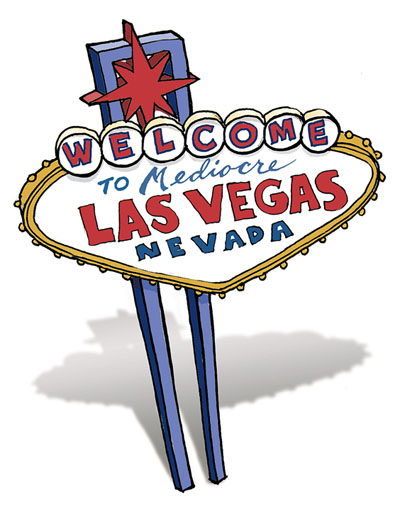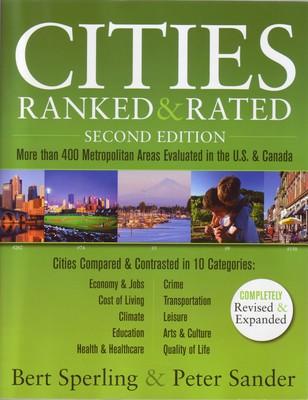STUCK IN THE MIDDLE
Fargo?
A city best known for the most grisly use of a wood chipper in modern cinema scores higher than the Entertainment Capital of the World in the latest edition of "Cities Ranked & Rated"?
Who's behind such an absurdity? That would be Bert Sperling, who, with Peter Sander, wrote the guide that ranks more than 300 metropolitan areas in the United States on everything from strength of economy to number of Starbucks outlets.
While Fargo, N.D., ranks No. 40 out of 373 cities, Las Vegas/Clark County comes in at 154. (For the record, Gainesville, Fla., takes the top spot.)
Las Vegas' score is 62.5 out of 100. Yeah, it's not terrible -- most schoolteachers would pass you, barely, with a 62.5 -- but it's just so ... mediocre.
If Chicago (No. 258) is a toddlin' town, what does that make Las Vegas? A middlin' town? (To add to the insult, Reno-Sparks is No. 64.)
Here are some of the cold, hard numbers:
* Our health and health care ranking: 349 out of 373.
* Our transportation ranking: 256.
* Our education ranking: 240.
Sure, we got that fifth-place for economy and jobs and the 74 in leisure and a 114 in media and libraries.
But it's all so kissing-your-sisterish.
It turns out that hearing crestfallen locals vent is nothing new for Sperling, who greets some subtle questioning of his book's conclusions with calm-bordering-on-bemused equanimity.
First of all, he says, this year's "Cities Ranked & Rated" (Wiley Publishing, $24.99) includes about 50 more cities than the first edition of the book, released in 2004. That time around, Las Vegas ranked 129.
Beyond that, he says, the book is simply a way for job hunters, retirement planners and wanderlust-stricken Americans to compare two or more American metropolitan areas head-to-head by whatever criteria -- health care, leisure opportunities, job availability -- they deem important.
"It's an impossible and perhaps a futile and thankless job to go and compare New York City with Fargo, North Dakota, and Las Vegas and every place in-between," Sperling says. "But those are the kind of choices people make."
What's important to comparison-shopping Americans varies at different points in their lives, he adds. A 20-something just out of college may be willing to accept low unemployment and a strong economy in place of cultural amenities, while a retiree may value the converse.
But Fargo? Sure, Gainesville probably is very nice, and we'll even grudgingly accept all of the Utah cities -- Ogden-Clearfield at No. 6, Logan at 12, Provo-Orem at 13, Salt Lake City at 27 -- that land in the top 40.
But Fargo? David Martin, president of the Chamber of Commerce of Fargo-Moorhead -- the neighboring North Dakota and Minnesota chambers merged in 1998 -- is nice enough to refrain from gloating.
"We're just very proud of the fact things are going well here and people are noticing," he says. "Even if they do smile (when they) say, 'Fargo.' "
Martin says Fargo actually has scored high in several such surveys over the years. And that, he's too polite to say, comes despite the stereotypes promulgated by a certain Coen brothers movie of a few years back.
"Our philosophy is, any recognition is good recognition if you have a chance of having people notice and telling your story," Martin says.
Martin has been to Las Vegas. In fact, he says, Allegiant Air offers regular nonstop flights from Fargo to Las Vegas, and that makes Las Vegas a popular vacation destination for Fargoans.
"People up here enjoy coming to Vegas, no doubt about it," Martin says, "and we'd trust that people from Vegas would enjoy coming up here."
Las Vegas Chamber of Commerce spokeswoman Cara Roberts politely declines to trash-talk Fargo. But, she offers, "our quality of life is superb. It must be: We continually attract 5,000 people a month to come and live in our city, so in my mind's eye, Las Vegas is doing many, many things right."
"It's always fun to see people's impressions of what they believe we are," Roberts adds, but anyone who actually visits Las Vegas would find that "we rank right up there with the great cities in our country."
So what's behind the numbers? Las Vegas, "maybe even more than any other city, is a city of extremes," Sperling says. "I mean, there's no place like Las Vegas out there. It is a fabulous city."
But, he adds, our rapid population growth has posed "some challenges for livability," and that's reflected in the city's rankings.
Thus, according to the guide, our cost of living index is 17 percent higher than nationally; our food index is about 11 percent higher than nationally; and our health care index is about 13 percent higher than nationally.
On the upside, Las Vegas scores well in other categories. Among them: A slightly higher per capita income ($23,864 versus $23,235 nationally), higher household income ($49,312 versus $46,414); and higher projected job growth (41 percent versus 12 percent).
Not to mention, of course, our big zero "hurricane risk score."
We also have a "diversity measure" of 68 out of 100, versus 40 nationally. That, Sperling says, represents the percent-chance that "the next person you meet walking down the street is of a different race or ethnicity than yourself."
Actually, Las Vegas didn't turn out to be much different from any other large city, Sperling says. "You'll find other major metropolitan areas have not fared well in this book overall. Overall, it's mostly a story this year of smaller places."
People are looking for affordable places to live where commutes are short and the services they need are readily available, he says, and Las Vegas' growth has been fueled by "people of ordinary means" seeking a place they can afford to live in.
But, now that they've arrived, Las Vegas' challenge becomes trying to sustain that growth, via improved infrastructure, both human (as reflected in numbers of police officers, student/teacher ratios and the like) and physical (as in roads and numbers of hospital beds, for instance).
And our ranking? "You can go ahead and blame it on your growing, vibrant city," Sperling says.
The rankings are "just a snapshot in time," he adds, and should be "taken within that context. And this is certainly going to be changed over the next years."
One thing that's sure to change in the book's next edition is Las Vegas' restaurant rating, which this time around came in at a scandalous one on a 1-to-10 scale (versus a national two).
A measly, pathetic one for a city filled with an army of betoqued celebrity chefs commanding a legion of gourmet restaurants few of us can afford but are happy to claim as our own?
"I was looking at that, too," Sperling admits, promising to review the data the next time around.
Speaking of which: Sperling says he's happy to receive comments at his Web site (www.bestplaces.net), which features searches by ZIP code and notes posted by locals.
Feedback from locals is "really valuable," he says. "For all the work I do here, no one knows your town better than you do."
| Fun facts | ||
|---|---|---|
| Dining and Shopping | Las Vegas | U.S. Average |
| No. Starbucks | 66 | 13 |
| No. warehouse stores | 6 | 2 |
| Health care | Las Vegas | U.S. Average |
| Physicians per capita | 166.6 | 244.2 |
| Hospital beds per capita | 188.9 | 420.0 |
| Cost per doctor visit | $89 | $77 |
| Cost per dental visit | $73 | $70 |
| Hazards and illnesses | Las Vegas | U.S. Average |
| Cancer mortality per capita | 189.1 | 201.9 |
| Depression days per month | 3.7 | 3.5 |
| Commute | Las Vegas | U.S. Average |
| Average commute time (minutes) | 26.4 | 27.4 |
| Percent commutes greater than 60 minutes | 4.8% | 5.9% |
| Commute by auto | 75.8% | 78.9% |
| Commute by mass transit | 3.9% | 1.9% |
| Work at home | 2.5% | 3.1% |
| Achievement | Las Vegas | U.S. Average |
| High school degree | 80.8% | 82.7% |
| 2-year college degree | 6.0% | 6.4% |
| 4-year college degree | 12.4% | 15.7% |
| Graduate/professional degree | 6.2% | 8.9% |
| Source: "Cities Ranked & Rated" |
TOP CITIES 1. Gainesville, Fla. 2. Bellingham, Wash. 3. Portland- Vancouver- Beaverton, Ore./Wash. 4. Colorado Springs, Colo. 5. Ann Arbor, Mich. 6. Ogden- Clearfield, Utah 7. Asheville, N.C. 8. Fort Collins- Loveland, Colo. 9. San Luis Obispo- Paso Robles, Calif. 10. Boise City- Nampa, Idaho *154. Las Vegas Bottom 10 Cities 364. Anniston-Oxford, Ala. 365. El Centro, Calif. 366. Alexandria, La. 367. Lafayette, La. 368. Farmington, N.M. 369. Monroe, La. 370. Merced, Calif. 371. Yuba City, Calif. 372. Visalia-Porterville, Calif. 373. Modesto, Calif. LAS VEGAS PROS AND CONS Pro Desert climate Job growth Air service Con Summer heat Rising home pricesTourist impact SOURCE: "Cities Ranked & Rated" BY THE NUMBERS Evaluations in "Cities Ranked & Rated" are ranked in 10 categories: Economy and jobs, cost of living, climate, education, health and health care, crime, transportation, leisure, arts and culture, and quality of life.The authors say numbers upon which the conclusions are based come from a variety of sources, from such public agencies as the U.S. Census Bureau and Centers for Disease Control and Prevention, to such private organizations as the American Medical Association and the Association of American Museums.The American cities are grouped according to Metropolitan Statistical Areas. In Las Vegas' case, that includes all of Clark County.A rank indicates a city's position among other communities. So, Las Vegas' rank is 154 out of the 373 American metropolitan areas surveyed.The book then expresses numbers in three ways:* A score represents an accumulation of points converted to a zero-to-100 scale, with zero being worst and 100 being best.* A rating is presented on a 1-to-10 scale, with one being lowest and 10 being best.* An index compares a quality against a national average or norm, with 100 representing the national average. So, an index of 140 would indicate something is 40 percent higher than the national average, while an index of 83 would indicate something is 17 percent lower than the national average.In other cases, such as population figures, raw numbers are used.A more comprehensive breakdown can be found in the book.























